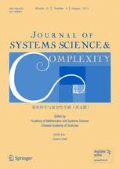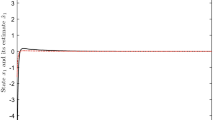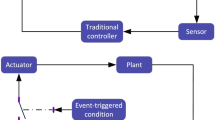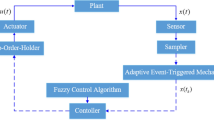Abstract
This study addresses the issue of dynamic event-triggered-based filtering for fuzzy affine systems. To alleviate the utilization of constraint bandwidth resources and improve the efficiency of the signals exchange, a dynamic event-triggered protocol is forwarded to regulate the trigger instants with objective system states. Meanwhile, the nonhomogeneous Markov process is proposed to characterize the dynamic behaviors of sensor faults, where the time-varying transition probabilities belong to a convex polytope set. Finally, the validity and applicability of devised filter design methodology for fuzzy affine systems are displayed via two practical models.
Similar content being viewed by others
References
Wu Z G, Shi P, Su H, et al., Network-based robust passive control for fuzzy systems with randomly occurring uncertainties, IEEE Trans. Fuzzy Syst., 2013, 21(10): 966–971.
Wang J, Ma S, and Zhang C, Resilient estimation for T-S fuzzy descriptor systems with semi-Markov jumps and time-varying delay, Information Sciences, 2018, 430–431: 104–126.
Liu X, Xia J, Wang J, et al., Interval type-2 fuzzy passive filtering for nonlinear singularly perturbed PDT-switched systems and its application, Journal of Systems Science & Complexity, 2021, 34(6): 2195–2218.
Cheng J, Shan Y, Cao J, et al., Nonstationary control for T-S fuzzy Markovian switching systems with variable quantization density, IEEE Transactions on Fuzzy Systems, 2021, 29(6): 1375–1385.
Zhao X, Yin Y, Niu B, et al., Stabilization for a class of switched nonlinear systems with novel average dwell time switching by T-S fuzzy modeling, IEEE Trans. Syst. Man Cybernet. Syst., 2016, 46(8): 1952–1957.
Wang J, Ma S, and Zhang C, Finite-time H∞ control for T-S fuzzy descriptor semi Markov jump systems via static output feedback, Fuzzy Sets and Systems, 2019, 365: 60–80.
Wang Y, Pu H, Shi P, et al., Sliding mode control for singularly perturbed Markov jump descriptor systems with nonlinear perturbation, Automatica, 2021, 127: 109515.
Wang Y, Xia Y, and Zhou P, Fuzzy-model-based sampled-data control of chaotic systems: A fuzzy time-dependent Lyapunov-Krasovskii functional approach, IEEE Trans. Fuzzy Syst., 2014, 1: 153–163.
Cheng J, Huang W, Lam H K, et al., Fuzzy-model-based control for singularly perturbed systems with nonhomogeneous Markov switching: A dropout compensation strategy, IEEE Transactions on Fuzzy Systems, DOI: https://doi.org/10.1109/TFUZZ.2020.3041588.
Xie X P, Yang D S, and Ma H J, Observer design of discrete-time T-S fuzzy systems via multiinstant homogenous matrix polynomials, IEEE Transactions on Fuzzy Systems, 2014, 22(6): 1714–1719.
Kim E, Lee C H, and Cho Y W, Analysis and design of an affine fuzzy system via bilinear matrix inequality, IEEE Trans. Fuzzy Syst., 2005, 13(1): 115–123.
Qiu J, Tian H, Lu Q, et al., Nonsynchronized robust filtering design for continuous-time T-S fuzzy affine dynamic systems based on piecewise Lyapunov functions, IEEE Trans. Cybern., 2013, 43(6): 1755–1766.
Wei Y, Qiu J, Lam H K, et al., Approaches to T-S fuzzy affine-model-based reliable output feedback control for nonlinear I tô stochastic systems, IEEE Trans. Fuzzy Syst., 2017, 25(3): 569–583.
Wei Y, Park J H, Qiu J, et al., Reliable output feedback control for piecewise affine systems with Markov-type sensor failure, IEEE Transactions on Circuits and Systems-II: Express Briefs, 2018, 65(7): 913–917.
Ning Z, Cai B, Weng R, et al., Nonsynchronized state estimation for fuzzy Markov jump affine systems with switching region partitions, IEEE Transactions on Cybernetics, DOI: https://doi.org/10.1109/TCYB.2020.3002938.
Tabuada P, Event-triggered real-time scheduling of stabilizing control tasks, IEEE Transactions on Automatic Control, 2007, 52(9): 1680–1685.
Zhou W, Fu J, Yan H, et al., Event-triggered approximate optimal path-following control for unmanned surface vehicles with state constraints, IEEE Transactions on Neural Networks and Learning Systems, DOI: https://doi.org/10.1109/TNNLS.2021.3090054.
Guo J and Diao J D, Prediction-based event-triggered identification of quantized input FIR systems with quantized output observations, SCIENCE CHINA Information Sciences, 2020, 63: 112201.
Zeng D, Zhang R, Park J H, et al., Reliable stability and stabilizability for complex-valued memristive neural networks with actuator failures and aperiodic event-triggered sampled-data control, Nonlinear Analysis: Hybrid Systems, 2021, 39: 100977.
Song J, and Niu Y, Dynamic event-triggered sliding mode control: Dealing with slow sampling singularly perturbed systems, IEEE Trans. Circuits Syst. II, Exp. Briefs, 2020, 67(6): 1079–1083.
Li H Y, Chen Z R, Wu L G, et al., Event-triggered fault detection of nonlinear networked systems, IEEE Transactions on Cybernetics, 2017, 47(4): 1041–1052.
Li Y X, Hu X Y, Che W W, et al., Event-based adaptive fuzzy asymptotic tracking control of uncertain nonlinear systems, IEEE Transactions on Fuzzy Systems, DOI: https://doi.org/10.1109/TFUZZ.2020.3010643.
Wu C, Zhao X, Xia W, et al., L2-gain analysis for dynamic event-triggered networked control systems with packet losses and quantization, Automatica, 2021, 129: 6544–6551.
Chen M, Yan H, Zhang H, et al., Dynamic event-triggered asynchronous control for nonlinear multi-agent systems based on T-S fuzzy models, IEEE Trans. Fuzzy Syst., DOI: https://doi.org/10.1109/TFUZZ.2020.3004009.
He W, Xu B, Han Q L, et al., Adaptive consensus control of linear multiagent systems with dynamic event-triggered strategies, IEEE Transactions on Cybernetics, 2020, 50(7): 2996–3008.
Zhao Q, Sun J, and Bai Y, Dynamic event-triggered control for nonlinear systems: A smaill-gain approach, Journal of Systems Science & Complexity, 2020, 33(4): 930–943.
Fei Z, Shi S, Ahn C K, et al., Finite-time control for switched T-S fuzzy systems via dynamic event-triggered mechanism, IEEE Transactions on Fuzzy Systems, DOI: https://doi.org/10.1109/TFUZZ.2020.3029292.
Wang J, Ma S, Zhang C, et al., Finite-time H∞ filtering for nonlinear singular systems with nonhomogeneous Markov jumps, IEEE Transactions on Cybernetics, 2019, 49(6): 2133–2143.
Yan H, Sun J, Zhang H, et al., Event-triggered H∞ state estimation of 2-DOF quarter-car suspension systems with non-homogeneous Markov switching, IEEE Transactions on System, Man, and Cybernetics: Systems, 2020, 50(9): 3320–3329.
Song J, Niu Y, Lam J, et al., Fuzzy remote tracking control for randomly varying local nonlinear models under fading and missing measurements, IEEE Transactions on Fuzzy Systems, 2018, 26(3): 1125–1137.
Wang M, Qiu J, and Feng G, A novel piecewise affine filtering design for T-S suzzy affine systems using past output measurements, IEEE Transactions on Cybernetics, 2020, 50(4): 1509–1518.
Ning Z, Zhang L X, Jose D J R, et al., Asynchronous filtering for discrete-time fuzzy affine systems with variable quantization density, IEEE Transactions on Cybernetics, 2017, 47(1): 153–164.
Author information
Authors and Affiliations
Corresponding author
Additional information
This research was supported by the National Natural Science Foundation of China under Grant Nos. 12161011, 62173100, the National Natural Science Foundation of Guangxi Province under Grant Nos. 2020GXNS-FAA159049 and 2020GXNSFFA297003, the Guangxi Science and Technology Base and Specialized Talents under Grant No. Guike AD20159057, the Innovation Project of Guangxi Graduate Education under Grant No. YCSW2021103, and the Training Program for 1,000 Young and Middle-Aged Cadre Teachers in Universities of Guangxi Province.
This paper was recommended for publication by Editor GUO Jin.
Rights and permissions
About this article
Cite this article
Cheng, J., Wu, Y., Wu, Z. et al. Fuzzy Filter Design for Affine Systems with Sensor Faults: A Dynamic Event-Triggered Approach. J Syst Sci Complex 35, 1761–1784 (2022). https://doi.org/10.1007/s11424-022-1071-2
Received:
Revised:
Published:
Issue Date:
DOI: https://doi.org/10.1007/s11424-022-1071-2




